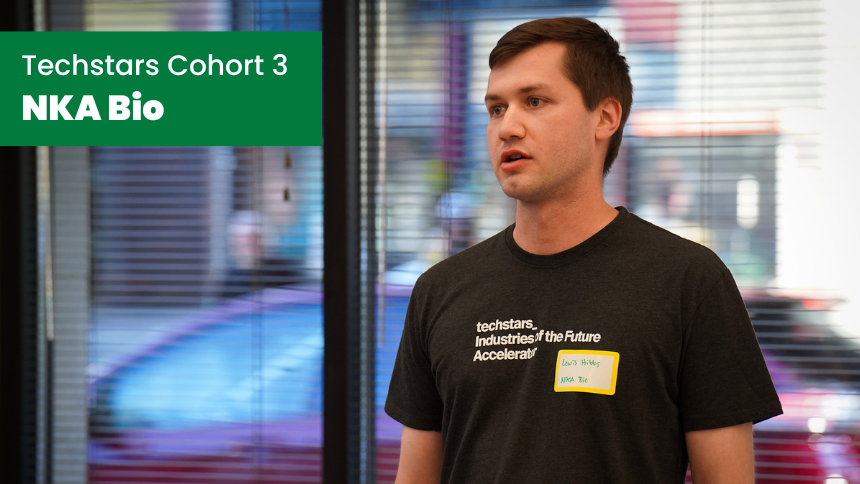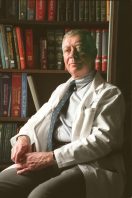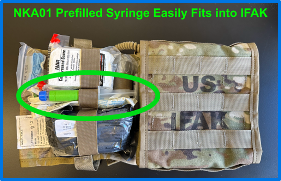
NKA Bio has a treatment that it says can press pause on death
The start-up was founded around a technology developed by the first Director of the Emergency Medicine at Johns Hopkins Hospital in Baltimore.
Imagine your family member made a discovery that could save the lives of millions of people around the globe every year but did not know how to get it to the people who needed it most.
Well, that’s exactly the situation Lewis Hibbs III and his mother, Susan Gann Hibbs, were in, when they founded NKA Bio to solve severe injury, the leading cause of death for people from age 1 to 44.
Today, the younger Hibbs is taking the company through the third cohort of the “Techstars Industries of the Future Accelerator” currently underway in Knoxville. Demo Day is set for June 6 from 4 to 8 p.m. EDT at Regas Square, 333 West Depot Avenue, and the public is invited. To register, click here.

“The technology was developed by my grandfather (Dr. Donald Gann) who was the first Director of Emergency Medicine at Johns Hopkins Hospital in Baltimore,” Hibbs III said.
Dr. Gann was a pioneer and leader in trauma care and biomedical engineering, also serving as the first Chair of Biomedical Engineering at Case Western Reserve University in Cleveland. Described as a polymath with a background in physics, philosophy, and medicine, Dr. Gann’s research was continuously funded by the National Institutes of Health to study the body’s response to hemorrhage.
Unlike today, the grandfather retained title to his inventions. Before he died in 2020, Dr. Gann had founded Shock Therapeutics Biotech to address a traumatic injury that causes more than five million deaths annually.
The daughter and grandson launched NKA Bio in February 2023 to continue Dr. Gann’s work but in a new company where the lead product, NKA01, is a temperature-stable antibody for trauma patients developed by Hibbs III. With an injection of NKA01 by a trained Emergency Medical Technician or Paramedic, more time is available for transport and lifesaving surgery.
 On its website, NKA Bio explains that “it is a race against time to get to surgery” when a person is severely injured. “The average death occurs eight minutes before lifesaving treatment can be delivered,” the website noted. “But in the future, when minutes count, our antibody will buy hours. At NKA Bio, our treatment presses pause on death. With an injection of NKA01 by EMS, our drug could buy more time for transport and lifesaving surgery.”
On its website, NKA Bio explains that “it is a race against time to get to surgery” when a person is severely injured. “The average death occurs eight minutes before lifesaving treatment can be delivered,” the website noted. “But in the future, when minutes count, our antibody will buy hours. At NKA Bio, our treatment presses pause on death. With an injection of NKA01 by EMS, our drug could buy more time for transport and lifesaving surgery.”
“We believe we have an antibody engineering platform,” Hibbs III explains. “The platform allows NKA Bio to screen millions of antibodies on the computer and predict the ones that bind best and has worked with 80 percent accuracy to date (compared to 12 percent in a leading publication). This has enabled us to build a pipeline of new antibody medicines for a fraction of what most pharma companies spend on just one antibody.”
In addition to NKA01, there are three other drug candidates in the pipeline. NKA02 is for sepsis, NKA03 for acute lung injury and advanced respiratory distress, and NKA04 is for heart attack resuscitation.
As far as the Techstars accelerator, Hibbs III says the NKA Bio team saw great value in working with partners like Oak Ridge National Laboratory and its scientists expertise in computational biomolecular physics, as well as the University of Tennessee (UT), specifically the Trauma Center at the UT Medical Center, which is one of only two adult Level 1 Trauma centers in the state.
If everything goes as planned, NKA Bio hopes to start clinical trials in humans by the end of 2025 and secure Food and Drug Administration approval by 2030.
Like what you've read?
Forward to a friend!

